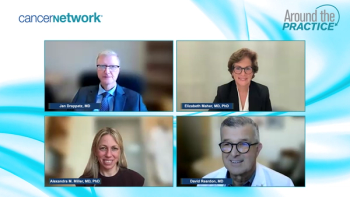
Panelists discuss how to manage borderline transaminase elevations in a patient benefiting from voracidinib therapy, balancing the risk of mild liver toxicity against continued disease control while investigating potential contributing factors.

Your AI-Trained Oncology Knowledge Connection!


Panelists discuss how to manage borderline transaminase elevations in a patient benefiting from voracidinib therapy, balancing the risk of mild liver toxicity against continued disease control while investigating potential contributing factors.

Panelists discuss how to manage slow FLAIR progression by initiating IDH inhibitor therapy, emphasizing the importance of setting patient expectations about tumor volume reduction and addressing special considerations for patients of childbearing age.

Panelists discuss how to counsel a 38-year-old patient with excellent surgical outcome about treatment options, weighing the benefits of early IDH inhibitor therapy against watchful waiting while considering individual patient factors and goals.

Panelists discuss how voracidinib shows superior brain penetration compared to other IDH inhibitors and explore exciting combination approaches with immunotherapy and vaccines that target the immunosuppressive effects of 2-HG in the tumor microenvironment.

Panelists discuss how to implement hepatotoxicity monitoring protocols, counsel patients about avoiding hepatotoxic substances, and manage the infrequent but manageable liver enzyme elevations that typically occur within the first 6 months of treatment.

Panelists discuss how early use of IDH inhibitors maximizes therapeutic benefit and address resistance mechanisms, noting that tumors typically develop bypass pathways rather than losing the IDH mutation itself.

Panelists discuss how the INDIGO trial's compelling results led to early FDA approval of vorasidenib for progressive IDH-mutant gliomas, and how they counsel patients on sequencing IDH inhibitors vs traditional radiation and chemotherapy while considering long-term quality of life implications.

Panelists discuss how they evaluate patients postsurgically by weighing factors like tumor location, extent of resection, patient age, and quality of life considerations to determine whether to pursue immediate treatment or surveillance, while emphasizing that microscopic disease always remains despite apparent gross total resection.

Panelists discuss how they perform comprehensive molecular testing using immunohistochemistry, FISH, and next-generation sequencing to identify IDH mutations and other critical markers like CDKN2A/2B loss that guide treatment decisions and tumor classification.

Panelists discuss how they approach the treatment journey by prioritizing early IDH mutation detection, coordinating multidisciplinary teams for maximal safe resection, and utilizing advanced surgical techniques to optimize outcomes while preserving neurologic function.

Panelists discuss how the 2021 WHO classification has fundamentally shifted glioma diagnosis from histologic appearance to molecular markers, particularly IDH mutation status, which now determines treatment strategies and prognosis.

Malignant glioma, the mostcommon primary centralnervous system (CNS) tumorin adults, remains one of the greatesttherapeutic challenges in oncologytoday due to the limited impact ofconventional cytotoxic therapies onoverall survival for patients with thesetumors. Although surgery and external-beam radiotherapy (XRT) can prolongsurvival, the value of adjuvantchemotherapy has been negligible formost malignant glioma patients. Theexception has been those patients withanaplastic oligodendroglioma and accompanyingchromosomal 1p and 19qloss-a fairly uncommon subset ofmalignant glioma patients who respondvery favorably to alkylatorbasedchemotherapy.[1]

Published: December 1st 2005 | Updated: